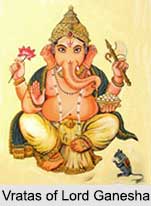 Vratas of Lord Ganesha helps a devotee to achieve success and to attain blessing for fulfilment of desires. One important way of Lord Ganesha"s upasana is Vratas by which one can try to get blessings from Lord Ganesha and achieve the peace of mind. Lord Ganesha is worshipped foremost amongst all Gods, and is regarded as the God of wisdom, peace and knowledge. The Vratas of Lord Ganesha includes various acts, such as, fasting on certain particular days, Tirtha or pilgrimage to sacred sites, visit and puja at specific temples; performing rituals and havens and chanting of prayers and mantras.
Vratas of Lord Ganesha helps a devotee to achieve success and to attain blessing for fulfilment of desires. One important way of Lord Ganesha"s upasana is Vratas by which one can try to get blessings from Lord Ganesha and achieve the peace of mind. Lord Ganesha is worshipped foremost amongst all Gods, and is regarded as the God of wisdom, peace and knowledge. The Vratas of Lord Ganesha includes various acts, such as, fasting on certain particular days, Tirtha or pilgrimage to sacred sites, visit and puja at specific temples; performing rituals and havens and chanting of prayers and mantras.
The aim of conducting the Vrata is to appease Lord Ganesha to attain desired result. However, the entire ritual and process should be undertaken with a religious resolution or Sankalpa. It is usually conducted at a fixed time on an auspicious day as per the instructions of the Panjika, a Hindu religious calendar.
Rules of Ganesha Vratas
The rules related to the Vratas of Lord Ganesha have been liberalized to a great extent to include the larger section of society. However, there are some guiding principles that are needed to be followed. These general rules preserve and protect the sanctity of the ritual. The rules are mentioned below:
•The devotee should remain clean and pure, speak the truth, consume vegetarian foods, observe celibacy, be patient, and religiously perform all the rituals.
•A Ganesha Vrata should never be left incomplete.
•A new Vrata should not be undertaken before completion of the existing one.
•Moreover a Vrata should not be observed during the period of "Ashaucha" (birth or death in the family).
•After a devotee has decided to perform the ritual, a Ganesha Vrata should be started on the auspicious time, date and place mentioned in the Panjika.
Ganesha Vratas
The following is a list of different types of Vratas of Lord Ganesha that are undertaken by the devotees. They are as follows:
•Varada Chaturthi Vrata
•Angaraka Chaturthi Vrata
•Durva Ganapati Vrata
•Ganesha Parthiva Puja Vrata
•Sankatahara Ganapati Vrata
•Gomaya Ganapati Puja
•Balamuri Ganapati Vrata
•Tantric Ganesha Vratas
•Vallabha Ganapati Vrata




















